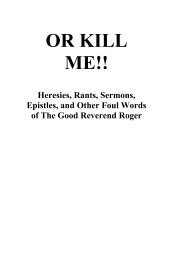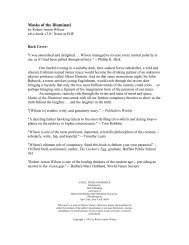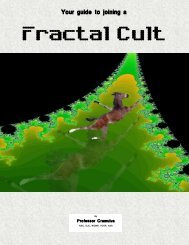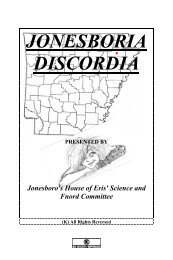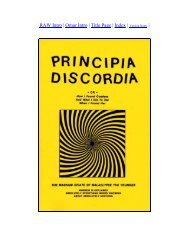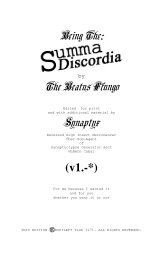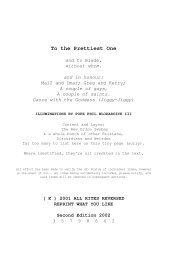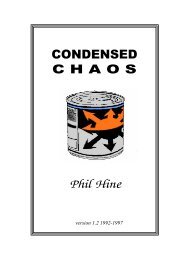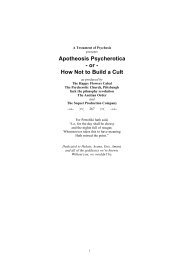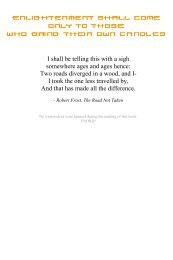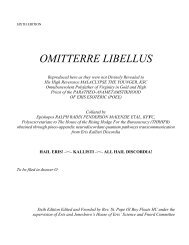Coincidance - Principia Discordia
Coincidance - Principia Discordia
Coincidance - Principia Discordia
You also want an ePaper? Increase the reach of your titles
YUMPU automatically turns print PDFs into web optimized ePapers that Google loves.
114 COINCIDANCE<br />
The Book of Job dares to raise the question—that is its eternal glory—but<br />
then hastily buries it under a cloud of meaningless rhetoric. Only the<br />
greatest works of art have dared to stare unblinkingly at the question<br />
without attempting to smooth it over or bury it—works like Medea, King Lear.<br />
Moby Dick, Beethoven's Fifth, Goya's Saturn Devouring His Children and The<br />
Disasters of War.<br />
The theological writings of Kierkegaard and Tillich make honest<br />
attempts to confront this question; and I respect these two men more than I<br />
respect the banal flow of bilge that issues forth from the "philosophers" of<br />
the American Humanist Association.<br />
(If the Reverend Schaef wants to write to the Realist again and renew his<br />
charge that I am a theologian in disguise, 1 will admit that he's not completely<br />
wrong —but I'm only a theologian in the sense that Antonin Artaud was.)<br />
But, is everything completely black and sharkish in Williams' view of the<br />
universe? Well, it has to be granted that it is not. Dr. Sugar does, finally, cure<br />
Cathy, through that discipline of unmitigated psychological honesty which<br />
is the essence of psychotherapy; and a universe in which such honesty and<br />
such cures are possible cannot be all bad.<br />
Indeed, the East which accepts the unity of good and evil, yin and yang,<br />
with such equanimity, has never forgotten that if the evil is omnipresent,<br />
why, then, so must be the good.<br />
And even Melville's vision—at the climax of Moby Dick, when the great<br />
Whale Armada comes before us—includes the significant detail that, with<br />
slaughter rampant all around them, the young whales at the center of the<br />
school are copulating and the mother whales are suckling their young.<br />
"And thus," Melville writes, "surrounded by circle upon circle of<br />
consternations and affrights... the creatures of the center fearlessly indulge<br />
in peaceful concernments . . . yea, in dalliance and delight."<br />
A few sentences later, Melville boldly declares the Oriental doctrine of the<br />
undefiled essence:"... and while planets of woe revolve around me, deep<br />
down and deep inland I still bathe in eternal joy."<br />
But Melville was no fatuous optimist, as we have seen. At the end, Ahab<br />
and whale destroy each other and, in ironic last testimony to the unity of the<br />
opposites, Ishmael returns to life floating on a coffin.<br />
And, similarly, Williams' Dr. Sugar, though he can cure one girl, has<br />
obviously no ilusions about himself or his science. The doctor has frightened eyes.<br />
Montgomery Cliff's sensitive portrayal brings this home to us in scene after<br />
scene, and two of the characters remark upon it.<br />
Nietzsche once wrote: "When you gaze into the abyss, the abyss also<br />
gazes into you." And the mystic Eckhart is even more direct: "The eye with<br />
which I see God is the eye with which God sees me."



